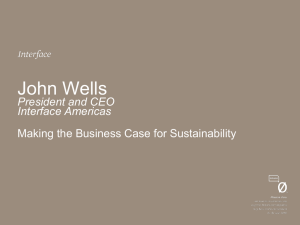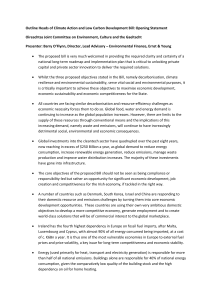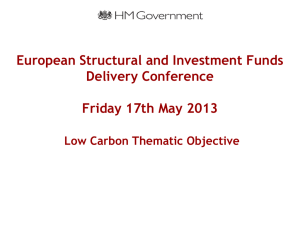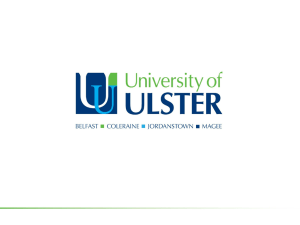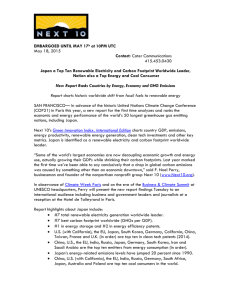The Merrill Lynch Environmental Sustainability
advertisement
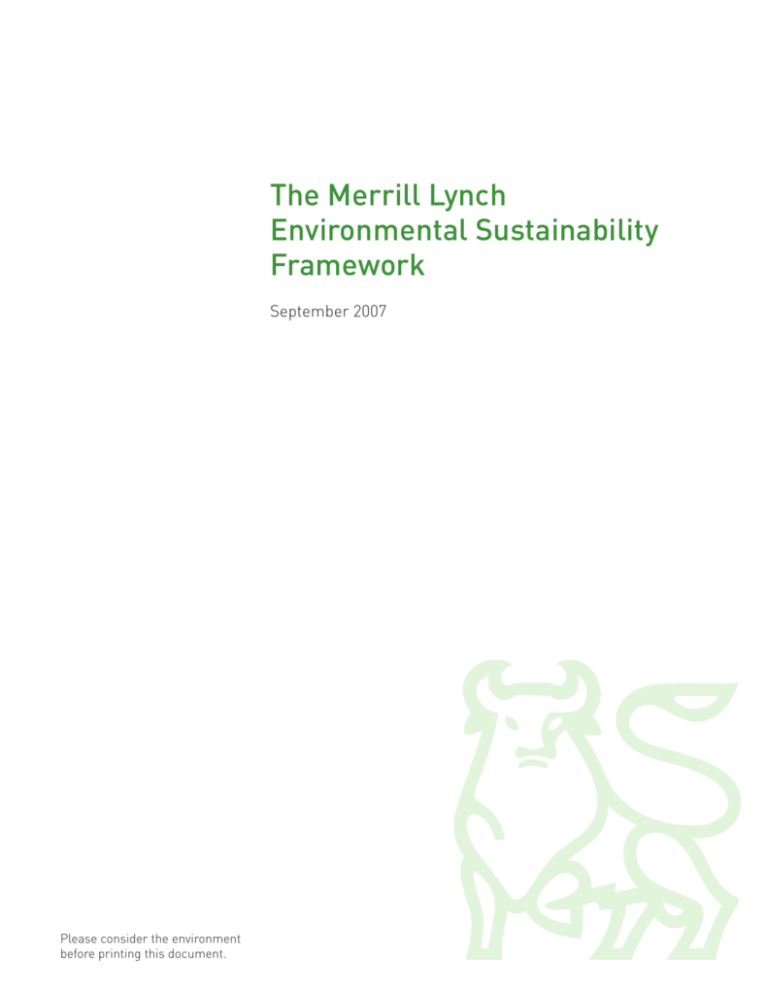
The Merrill Lynch Environmental Sustainability Framework September 2007 Please consider the environment before printing this document. The Merrill Lynch Environmental Sustainability Framework Table of Contents 1 Environmental Stewardship at Merrill Lynch 1 An Advocate for Market-Based Solutions 2 Highlights 2 Confronting the Consequences of Climate Change 5 Renewable Energy Requirements 5 Managing Our Own Houses 6 Sustainable Finance 9 Education, Recruitment and Philanthropy 9 Investment Decisions and Due Diligence 10 Thought Leadership 10 Future Focus Environmental Stewardship at Merrill Lynch At Merrill Lynch, a longstanding commitment to the fundamental principles of corporate social responsibility underpins our recognition that protecting our global ecosystem is of vital importance to us as a commercial enterprise as well as a responsible corporate citizen. We are committed to reducing unnecessary or wasteful exploitation of scarce nonrenewable resources. And we are committed to providing sound investment analysis, guidance and capital to enterprises dedicated to promoting environmentally responsible and sustainable economic development. An Advocate for Market-Based Solutions A broad political consensus has emerged in recent years that the private sector in general (and the financial services industry in particular) possess the intellectual and financial capital to produce effective solutions to a wide range of social challenges. In conjunction with a prudent regulatory environment, the free markets’ inherent capacity to efficiently allocate capital to promising investment ideas will, we believe, foster investments in technological solutions that will ultimately provide the key to mitigating GHG (Greenhouse Gas) emissions and other pressing environmental challenges. These solutions will, in turn, help to sustain the steady pace of global growth and economic opportunity that have produced profound improvements to the material lives of millions worldwide. As a provider of capital to new and established firms and organizations in both the public and private sectors, as an investor committed to exploring and exploiting new venture capital and market opportunities in the burgeoning areas of green tech, clean tech and alternative energy, as an employer, recruiter and retainer of talent, as a wealth manager serving high-net-worth individuals, as a provider of guidance and advice to institutional clients and of leading-edge research to institutional and individual clients, and as a trader, market maker and operator of facilities worldwide, we recognize our responsibility to make — wherever possible and practical — positive contributions to global ecological health, while minimizing our business activities’ adverse impacts on the environment. We see no conflict or obstacle between undertaking such commitments and retaining our adherence to responding to the needs and interests of our clients, business partners, shareholders and stakeholders. Environmental Sustainability Framework Highlights • W e analyze emerging green technologies through our Research reports, renewable energy investor conferences, and the Merrill Lynch Renewable Energy Index. • W e facilitate financing for green technologies globally. Our clients range from a Chinese solar energy company to the European Investment Bank to the financing arm of the European Union, which recently issued a “green” bond on which we served as an advisor that finances renewable energy and energy efficiency projects. • W e promote proprietary investments in green technologies, including a Russian company that reduces gas transmission pipeline leakage and a California company that employs geothermal energy to generate electricity. • W e actively trade carbon credits in the emerging carbon markets of the world – especially in the European Union’s European Trading Scheme (ETS). • W e are committed to reducing the carbon footprint on a per occupant basis of our twenty-two proprietary facilities by an average of 2% annually. We will offset our carbon emissions related to electricity consumption, heat usage and commercial travel by purchasing sufficient voluntary credit offsets. • W e contribute intellectual capital to environmental protection, both in our professional capacities and in our private support of environmental organizations worldwide, including the London Accord on Climate Change and the U.K.-based Carbon Disclosure Project. • W e are represented as a constituent-company in a number of socially responsible investment indices worldwide. Confronting the Consequences of Climate Change As one of the world’s preeminent financial services firms, we have both an opportunity and an obligation to play a significant role in the formulation of public policy and in the allocation of substantial capital to new and existing enterprises. As an investor and provider of capital to incumbent and new entrants alike, we are well positioned to contribute in myriad ways to a lasting and efficient resolution to our commonly shared ecological predicaments. Environmental Sustainability Framework Although not advisers in climate science (despite our employment of meteorologists on staff to advise us on weather-related hedges and other climatologically-based investment products), our extensive capital markets expertise reinforces our conviction that a free market system that places a quantifiable price on carbon emissions will provide the most efficient and effective vehicle to address the Global Greenhouse Gas (GHG) challenge. We likewise believe that where we can add the most value to this broad undertaking is by putting our quantitative and analytical expertise to work identifying, exploring, investing in and helping to scale up specific market-based solutions that we deem most likely to generate the highest rate of return for our clients and shareholders. Our self-assigned role as “essential partner” to our clients will influence multiple industries to more precisely define the context in which environmental and sustainability issues are ultimately addressed and resolved. Our contributions, being primarily quantitative, analytical and financial in scope, will range from (1) counseling clients on the best methods of engaging with environmental concerns to (2) provoking debate in the public arena to (3) continually adding value within our corporate capacities while (4) maintaining a public posture consistent with our identity as a firm. Carbon Trading Merrill Lynch believes that governmentally mandated, enterprise-specific caps on GHG emissions with tradable permits – commonly referred to as a “cap-and-trade” mechanism – most effectively marries public policy with the beneficial effects of free market mechanisms. As currently implemented for carbon emissions in the European Union and sulfur emissions in the United States, carbon trading markets establish a long-term price signal for carbon that is both quantifiable and stimulates future investment in zero or low-carbon emission technologies. We publicly support the development of a cap-and-trade system of carbon reduction in the U.S. and other countries currently non-participating in the Kyoto Protocol. We are convinced that such a step is most likely to produce the most efficient allocation of capital in pursuit of technologies designed to mitigate the adverse affects of climate change. As occurred during an earlier era of heightened environmental concern, as industrial societies confronted the palpable social and health costs of air and water pollution, successful emission-control legislation must assign specific financial costs to specific emitters. Monetizing the public costs of emissions will bring market forces into play. Those market forces will in turn require investors in those companies most Environmental Sustainability Framework directly affected to demand results in the form of actions intended to reduce those firms’ collective exposure to the negative consequences of climate change. Analogous to the clean water and air laws and regulations promulgated during an earlier era, success in addressing GHG emissions will require that GHG emitters be held financially accountable for the cost of those emissions. In short, we believe the world can and will meet its carbon challenge by ensuring that carbon emissions are subjected to rational market discipline. Our emphasis on the positive impact of a functional free market should in no way be construed as encouraging governments or regulatory agencies to abdicate their responsibility to help to define and shape our evolving environmental consensus. Governmental policies can and will create incentives for investors and entrepreneurs to develop technologies required to reduce GHG emissions while mitigating other adverse consequences of commercial activity. This process will inevitably require the efficient provision of adequate capital, which, operating in a functional and transparent marketplace, will establish the accountability of specific enterprises for their emissions. Most importantly, more precise identification of the costs of GHG emissions will aid enterprises in identifying the potential rewards to be gained through the development and implementation of cost-effective technologies and solutions. A similar rationale underlies our decision to join a coalition of companies organized by CERES (The Coalition for Environmentally Responsible Economies), comprised of a number of major public pension funds and prestigious corporate peers, in calling for immediate action by the United States federal government to create marketbased solutions to GHG emissions. In Europe, we have broadened our efforts by becoming a founding member of the London-based Carbon Disclosure Project, which provides a rigorous secretariat for the world’s largest institutional investor collaboration on measuring the business implications of climate change. We so strongly agree with the business maxim, “if it doesn’t get measured, it never gets managed” that we are the primary sponsor and public advocate for the extension of the Carbon Disclosure Project to the S&P 500 in 2007. Environmental Sustainability Framework Renewable Energy Requirements Trading markets are not, of course, the only incentives or mechanism for promoting investment in environmental technologies. Where government creates scarcities, capital can be attracted by the potential returns for “early movers.” This dynamic underlies the targets established by nearly half of the U.S. state governments, mandating that a definite proportion of electricity be generated by renewable sources – most notably, California’s requirement of 20% by 2010. Recognizing that potential opportunities may flow from these policies, Merrill Lynch Research regularly reports on solar energy, biofuels and other renewable energy technologies. We annually host a renewable energy investors’ conference. Our investment bankers around the world have arranged financing for a significant number of renewable energy companies. A preponderance of evidence indicates increasing investor participation in renewable energy companies, as reflected in the January 2007 inauguration of the Merrill Lynch Renewable Energy Index. Back-testing five years demonstrated that the aggregate value (in US$ terms) of the twenty-two companies in the index increased by 216% - substantially exceeding the returns of a widely followed global index of traditional energy companies. Similarly, we and other investors have become active in financing nonpublic ventures in renewable energy. Managing Our Own Houses Merrill Lynch operates through twenty-two proprietary office centers located in Canada, Hong Kong, Ireland, Japan, the United Kingdom, and the United States, which in aggregate house over 30,000 occupants. Because environmental responsibility begins at home, we are determining cost-efficient means of reducing even further the impact of an operation that currently produces a comparatively low environmental impact. We have committed to reducing our energy consumption and emissions firm-wide (on a per occupant basis) by an average of 2% annually. We will design future proprietary office centers to adhere to a minimum standard of the Gold certification rating under The Leadership in Energy and Environmental Design (LEED) Green Building Rating System.™ Environmental Sustainability Framework We will mitigate our own GHG footprint by purchasing or sourcing sufficient voluntary credit offsets to neutralize our greenhouse gas emissions related to electricity consumption, heat usage and commercial travel. We have further reduced our global impact by recycling, temperature and lighting management, encouraging two-sided copying and promoting a myriad of other environmental “wedges.” For example, in our Tokyo operations, recently adopted initiatives will result in the production of nearly 1,000 fewer tons of carbon dioxide emissions each year. Sustainable Finance At Merrill Lynch, our definition of Environmental Sustainability encompasses environment and cultural stewardship in addition to the promotion of equal economic opportunity for all. While our primary expertise remains in the fostering of economic opportunity, we fully recognize that environment and cultural stewardship and economic opportunity are, in fact, deeply intertwined and complementary. As an illustration, absent diligent stewardship of environmental and human resources, economic opportunity cannot be sustained. Lack of economic opportunity also precipitates environmental and cultural tragedies, such as deforestation for fuel and mass immigration to urban slums. Investments in green technologies will create economic opportunities for millions while enhancing the quality of life for all. Since economic opportunity cannot be detached from other components of Sustainability, we seek to offer our services to those enterprises, industries and geographical areas where Sustainability issues are routinely addressed. Our decision-making remains consistent with the Equator Principles, a widely accepted financial industry benchmark for determining, assessing and managing social and environmental risk for project financing. We do not finance activities that we know will contravene international or local environmental law. There have been lawful deals that we have declined to pursue after determining that they pose a danger of doing unjustifiable damage to the environment or a vulnerable population. However, in all cases we intend to fulfill our role as essential partner to our clients by serving as an educator-advocate for sustainable business practices. We believe that rather than being judged by the deals we decide not to do, we prefer to be judged by the deals that we do, which either minimize a negative or foster a positive environmental and social impact. Environmental Sustainability Framework Forestry We recognize that forests represent a valuable and prudently exploitable natural resource and a source of economic opportunity in many regions of the world. Illegal over-exploitation, however, incurs irreparable environmental and social destruction. We will not knowingly facilitate illegal logging, either directly by purchasing illegally harvested timber or indirectly by arranging financing for illegal logging projects. With respect to timber harvested in countries where illegal logging is prevalent, we will strongly consider the existence or absence of internationally recognized independent third-party certification as a factor in our investment decisions. In addition, when absent, we will encourage appropriate vendors and issuer clients to secure internationally recognized certification. When purchasing products harvested in fragile ecosystems, we intend to work closely with valid third-party certification organizations to impose a level of objectivity on the environmental, social and economic impacts on these habitats. We will provide specialized training on the protection of fragile ecosystems to appropriate investment, purchasing and facilities personnel. Native Peoples In certain regions, governments may deny native peoples democratic protections - particularly when located proximate to valuable natural resources. Historically, facilitating under-the-table payments by those seeking access to these resources have overwhelmed the interests of native peoples. Accordingly, we will decline to finance projects if we are aware that the U.S. Foreign Corrupt Practices Act or other anti-bribery laws have been violated. We strongly endorse and support the Extractive Industries Transparency Initiative, a global effort initiated by the U.K. government against undisclosed payments. In regions and regimes where we know that democratic principles may be inapplicable, we will consider the interests of native peoples. And in cases where projects do go forward, we will provide advocacy for the effective mitigation of all economic and cultural damage. Power Generation We arrange financing for clean power technologies. Our clients range globally from wind power companies in the United States to solar power companies in the People’s Republic of China. We have invested our own proprietary funds in a number of green companies, including a California geothermal energy company and a Russian company that repairs leaking gas transmissions lines. Environmental Sustainability Framework We publish opinion-shaping Research on renewable energy, have created the Merrill Lynch Renewable Energy Index, and annually host a renewable energy investor’s conference. We also recognize that the transformation to cleaner energy sources, although clearly accelerating, will be neither cost-free, nor immediate. Coal In many regions of the world, coal is an abundant, domestically-available fuel for power generation. We have not the slightest doubt that as a result, coal will continue to be mined and employed as a critical energy resource for decades if not centuries to come. Over the years, however, coal generation has raised a number of significant environmental issues, including the production of particulate and sulfur emissions, the adverse affects of which have in some cases been significantly mitigated by technological advances, albeit not without cost. The greenhouse gas emissions associated with coal have also become a significant environmental concern. Currently, no proven or cost-effective technology exists that is capable of mitigating these emissions on an industrial scale. In the absence of such technology, any abrupt proscription against coal generation would meaningfully destroy economic opportunity. Yet we remain optimistic that if provided with appropriate incentives from the free markets and government, technological advances will ultimately reduce GHG emissions worldwide. Since we endorse policies that provide incentives for investment in new technologies and/or reduce emissions by penalizing inefficient energy practices, we prefer to finance electrical generation when the producer is a recipient of effective initiatives to reduce GHG and other pollutants, subject to the current state-of-the-art, including energy conservation. Where the producer has not received such incentives, we will be advocates of best practices. We further recognize that in some regions, coal extraction poses an unjustifiable danger to its workforce. We will not finance any mining project where we are aware that management disregards the safety of workers. Environmental Sustainability Framework Water Access to abundant pure water is so critical to the sustenance of biological life on this planet that the control of its sources has been and is likely to remain a significant source of human conflict for sometime to come. In recognition of its profound importance to our common future, we seek to finance projects that will facilitate an abundance of pure water while declining to finance projects that we have reason to believe may violate laws protecting public and private access to clean water. We will be advocates for best practices in sustaining clean sources of water and in reversing past environmental insensitivities in the provision of water to communities. In our own proprietary facilities, we strive for water use efficiency, diminishing per occupant water usage over time. We practice water usage transparency, annually publishing proprietary water usage on our environmental sustainability website. Education, Recruitment and Philanthropy We are exploring how to best incorporate environmental components into our existing comprehensive signature educational programs for youth. We are currently developing environmental components for our Model United Nations and Sesame Workshop educational initiatives. We are strengthening and deepening our established relationships with leading environmental organizations. We are sponsors of the MIT Joint Program on the Science and Policy of Global Change in conjunction with the Center for Energy and Environmental Policy Research (CEEPR). Investment Decisions and Due Diligence Our due diligence procedures are in the process of being strengthened to raise red flags and elevate environmental and reputational concerns. Most importantly, bankers are being trained on how to effectively counsel clients on addressing the emerging environmental expectations of the capital markets. For example, such training would include educating a company in the forest product sector on the requirements and benefits of securing internationally accepted third-party certification that the company does not engage in illegal or socially and environmentally irresponsible forestry practices. Environmental Sustainability Framework Thought Leadership As advocates of market-based decision making, we expect to become increasingly vocal in support of government actions that would encourage the flow of capital into green solutions. In addition to mandatory cap-and-trade regimes, we favor legislation to facilitate private investment in promising new technologies across the green spectrum. In addition to incentives, we will consider the advisability of emissions-based taxes, as increasing the cost of adverse conduct makes the relative cost of remediation more favorable. We seek to carve out a socially significant role for the firm in identifying issues and moderating discussions between governments, international organizations and the private sector to facilitate more thoughtful decision making. We further envision adopting a collaborative role with other thought leaders, including prominent think tanks and academic centers. To this end, as noted earlier, we recently became a sponsor of the MIT Joint Program on the Science and Policy of Global Change, co-directed by noted professors of atmospheric sciences and applied economics. Future Focus At Merrill Lynch, we remain optimistic that the world’s daunting environmental challenges will ultimately be solved by the positive interaction of free markets, free citizens, responsible governments, sound science and cost-effective technology. We firmly believe that what free capital markets do best is to funnel a flow of funds to those ideas judged most likely to generate the highest rate of return to investors. And in so doing, they serve to provide the financial and intellectual support that will permit such solutions to either falter or thrive in the vibrant and dynamic global bazaar of ideas and technologies that — fortunately for us all — defines our world today. 10 Environmental Sustainability Framework For more information, visit www.ml.com/environmental_sustainability ©2007 Merrill Lynch & Co., Inc
